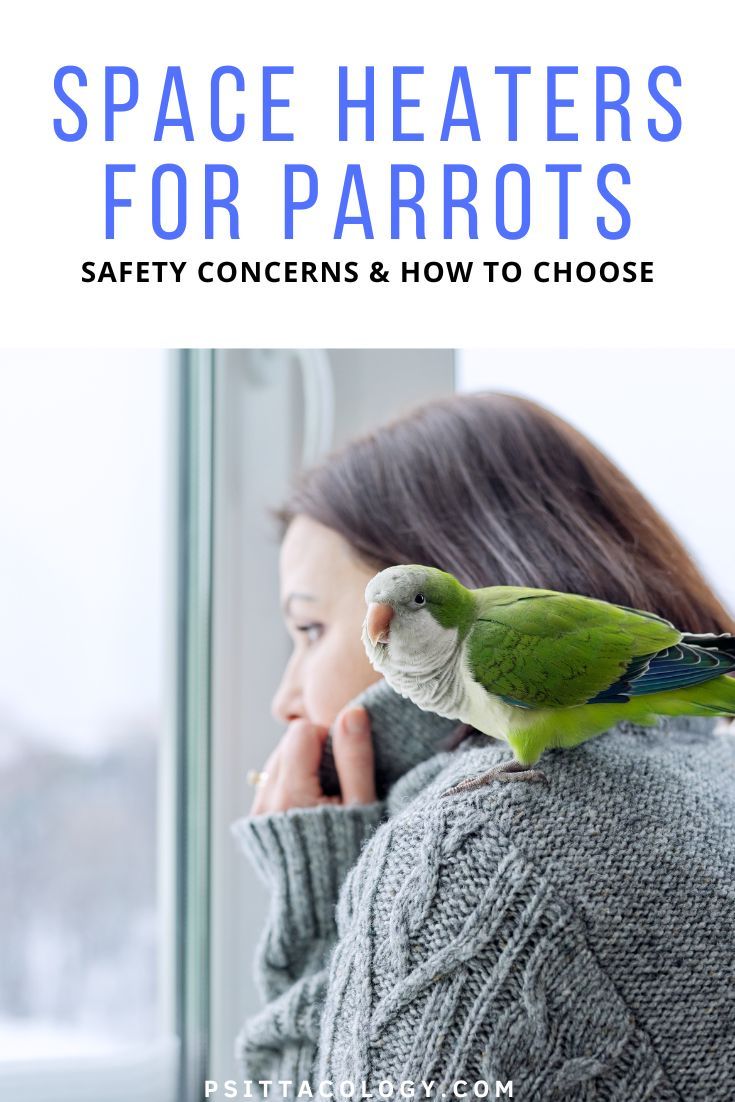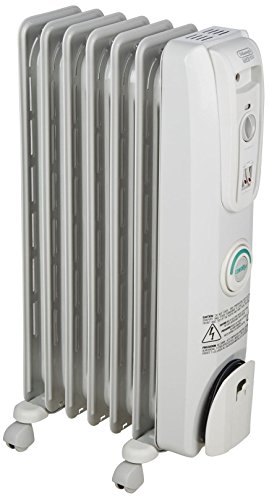Fall is well on its way as I write this, and temperatures are dropping. If your parrot is starting to look a little fluffed up, it may be missing the warm summer months and need a little supplemental heat.
Thinking of using a space heater? Keep reading. Although space heaters can indeed be safe for parrots, choosing the right type can unfortunately be a matter of life and death.
This post contains affiliate links. If you make a purchase, a small percentage will go directly to Psittacology at no additional cost to you. Thank you for supporting Psittacology!
Does your bird need a heater?
As mentioned in the post on keeping a parrot warm in winter, most of our feathered pets are tropical species. Although some deal with cold better than others, they do absolutely prefer a comfortable room temperature.
If your parrot looks fluffed up, is shivering, and seems less active than normal, check the thermometer. It might be cold! This especially applies if you keep your bird in an unheated room or if the temperature tends to drop at night.
There are various ways to offer some supplemental heat, like by using a high-quality heated perch. Sometimes it’s just more convenient to heat the whole room, though.
Because cranking up the thermostat can cause your electricity bill to rise out of control (or you don’t even have central heating, like me), a space heater may be the best option for you.
Space heaters can be safe for parrots, and indeed be a great option for keeping your bird warm. However, it’s extremely important to pick the right type.

How to choose a space heater
There are a few considerations to keep in mind when it comes to choosing a space heater to heat your parrot room.
Let’s have a look at everything you need to know and then discuss two suitable types of space heaters that you could consider.
Prevent burns
First off, for obvious reasons, you should never use a heater with exposed heating elements near your parrot. They’re just too curious for their own good, and accidents are bound to happen.
Prevent fumes
You should avoid using gas heaters in your bird room. They can produce carbon monoxide, which birds are much more sensitive to than us humans. Additionally, some can also release fumes that are harmful to their respiratory system.
Heaters that have a PTFE (non-stick) coating can also emit toxic fumes, especially when they overheat. It’s not likely, but better safe than sorry! You should avoid these for the same reason you should avoid using non-stick cookware around your parrot or other bird.
Suitable space heaters for parrots
OK, so gas heaters and space heaters that have a PTFE coating are out. What does that leave us with?
Your best choices for space heaters for the parrot room are:
- Ceramic heaters. Efficient, small, and don’t emit light. Most have a fan to evenly heat warm spaces. They can get very hot to the touch, so care must be taken if parrots are loose. Hold your wrist against the heater to check the temperature before letting your bird out to play.
- Oil-filled heaters. These look like regular mini radiators on wheels. They heat evenly, don’t tend to get scorchingly hot (though be sure to check), and don’t emit light. They’re also relatively energy-efficient, plus nice and quiet.
My choice, and that of most parrot parents? An oil-filled heater. They’re quieter and retain heat well even when they’re shut off. The ones I’ve tried don’t get hot enough to the touch to burn parrot feet.
Ceramic heaters are a little more efficient, but their fans make noise and blow around or even suck up dander. The ones that aren’t designed to have a cool exterior can get much too hot, meaning you’d have to cage your parrot to prevent accidents.
I recommend choosing a quality heater with a built-in thermostat. These are less prone to overheating, which can cause fumes to be emitted or even be a fire hazard. Your heater should also have tip-over protection.
The De’Longhi Comfort Temp is a popular option.
Safety considerations
Keep in mind that you’ll have to run heaters that tend to get hot on low or “cage” them, like by placing chicken wire around them to keep your parrot off. You don’t want your bird to land on a piping-hot heater and burn its delicate feet! Oil-filled heaters often stay cooler than ceramic ones.
Most parrot owners like to run the heater on maximum heat outside for a few hours or even a few days after buying it. This safely burns off any coatings that it may have left the factory with and that could be harmful to birds.
Once the “new heater smell” is gone, you’re good to go.
Tip: Keep an eye on the humidity if you’re running a heater. They can dry out the air, which makes your parrot’s skin (and your own sinuses) itchy. Luckily, oil-filled heaters especially don’t dry the air as much as some other types.
Frequently asked questions
I’m a bit iffy about this. If your heater has all the safety features, it should be fine, but I would personally still rather not. Oil-filled heaters stay warm for a good while after shutting them off, so that could be a good option if you’re worried as well.
If you have any more questions about space heaters for parrots or if you’d like to share your own experiences, don’t hesitate to leave a comment below!


